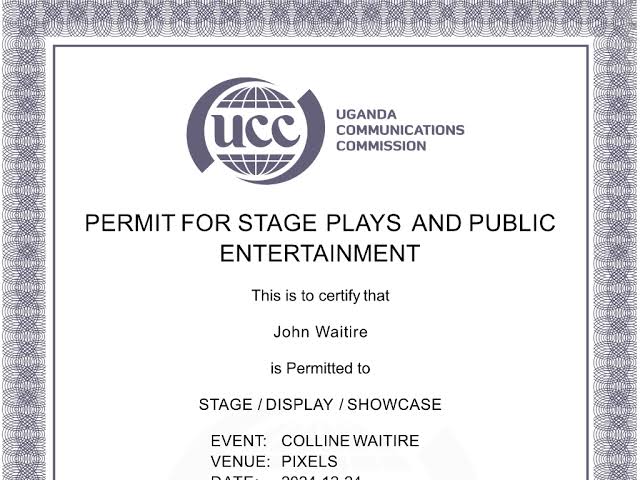How does a 26-year-old regulate a 66-year-old? Is the older individual in the wrong? Do they require constant reminders, or have they simply succumbed to the effects of time, perhaps even a stroke? These questions linger in my mind as I reflect on the recent developments in Uganda’s theatre industry.
On the night of February 21, 2025, GZK hosted a remarkable theatrical production—30 Years of Bananas, a play written by Alex Mukulu and directed by Phillip Luswata. The audience was captivated, the execution was stellar, and the art spoke for itself. However, what followed was unsettling: a stricter regulation was issued regarding how broadcasting services shall be penalized for advertising stage plays without a permit from the Uganda Communications Commission (UCC).
A friend reached out the following day, asking about what we had done at the show. The irony was not lost on me. The entire time, a good friend and I sat in the audience, enjoying the performance yet anxiously anticipating the possibility of being escorted away by men in camouflage for daring to be liberal with our art. But this raises an important question: if Uganda’s premier academic institution houses a School of Liberal and Performing Arts, why then is artistic expression so tightly censored? That debate, however, is for another day—one that we are evidently not yet prepared for.
If you were unaware, obtaining a permit to stage a play now costs UGX 100,000 per show. Should a production run for five days, the total climbs to UGX 500,000. And we, the artists, are expected to graciously acknowledge UCC for allowing us to perform.
The situation feels eerily reminiscent of the late Byron Kawaddwa’s era. A troubling question also arises: if one advertises a production on personal social media platforms, does this act fall under the jurisdiction of the Computer Misuse Act, which also falls under UCC’s domain? The thought alone is exhausting.
One wonders—why can’t the Uganda National Cultural Centre (UNCC) take on this responsibility instead of an external entity imposing regulations on our industry? Should a visitor dictate the rules of a home they do not belong to, one whose customs they do not understand? Imagine someone entering a household, serving food to the children despite not contributing to its preparation, and then carrying the majority of it away, leaving the home in scarcity.
Granted, the head of the house may suffer from occasional amnesia, sometimes entrusting its affairs to unqualified individuals, but at least they are still present. What remains most concerning is that after offering only a fraction of the food to those within the home, the visitor departs with the bulk of it, leaving the household in drought. But then again, haven’t we been here before? During the lockdown, we learned to sip porridge to survive.
Perhaps it is time to allow UNCC to function as it should—not merely as The National Theatre, but as a body that truly represents and regulates the arts. We need to build structures that empower it to govern effectively, providing both leadership and human resources that understand not only the politics but also the market dynamics of today’s cultural and entertainment industry.
The creative sector significantly contributes to the economy, yet the lens through which it is viewed remains frustratingly translucent. If policymakers truly understood its impact, they would recognize that every stage play generates economic activity—audiences drive to the theatre, purchase drinks and snacks, dress up for premieres, and even invite foreign visitors who experience our art at hotels, conferences, and official receptions. And yet, despite all this, the performing arts remain a non-priority sector.
With all these new regulations, the crucial question remains: what value do we receive in return for these costly permits? Are artists entitled to an end-of-year celebration with pizza to honor their contributions? Do we at least share in the profits generated from these permits? Or is the money invested in equipment that artists can borrow at subsidized rates?
At this point, it feels as though stage plays are being subjected to an unnecessary financial strain. Perhaps we were better off in the Musiru ddala ddala era—where we could create freely, unburdened by bureaucracy.
Theatre should be a space for expression, not suppression. It is time we re-evaluated these regulations and sought a system that truly supports and uplifts the arts.
@Ulokcwinyu Ubia
This post was created with our nice and easy submission form. Create your post!






